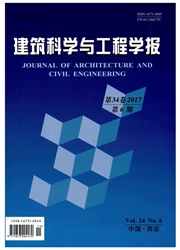

 中文摘要:
中文摘要:
针对土木工程中所用的纤维筋耐火能力问题,对27组,共100根玻璃纤维(GFRP)筋试件在火灾高温时的力学性能进行了试验研究,试验中主要考虑了温度和受火时间的影响,得到了火灾高温中和火灾高温后玻璃纤维筋的抗拉强度和弹性模量。试验结果证明:玻璃纤维筋的力学性质表现出明显的阶段性,110℃时粘结胶体逐渐软化而丧失粘结能力,但温度下降后其粘结强度还可以恢复;190℃时粘结肢体已基本碳化,其粘结性能将不能再恢复。因为受到火灾高温的影响,玻璃纤维筋的强度和弹性模量均会下降,若所经历的最高温度低于190℃,其力学性能还可恢复;若高于190℃,将不能再恢复。这些试验结果可以用于玻璃纤维筋增强混凝土结构抗火设计中。
 英文摘要:
英文摘要:
The fire-resistance behavior of FRP bars is lower than that of steel reinforcement. Experimental studies were carried out on 100 (27 groups) GFRP bars exposed to high temperature under axial load to investigate the mechanical behavior of GFRP bars under fire and after fire. The parameters considered are temperature variation and the time exposed to high temperature. The tensile strength and the elastic modulus of GFRP bars were investigated through test. The test results were obtained during and after high temperature exposure and indicate that the mechanical behavior of GFRP bars has obvious phasic changes: the resin will soften when temperature is higher than 110 ℃. At this point, the resin will no longer be able to transfer stresses from fiber to fiber, but the bond strength of resin will be recovered when temperature decreased. The resin will be carbonized when temperature is higher than 190 ℃. At this point, the bond strength of resin will not be recovered. When the strength and the elastic modulus of GFRP bars decrease with the rise of temperature, it can be recovered when the highest temperature experienced is under 190 ℃. The results can be applied to fire resistance design of GFRP reinforced concrete structures.
 同期刊论文项目
同期刊论文项目
 同项目期刊论文
同项目期刊论文
 期刊信息
期刊信息
